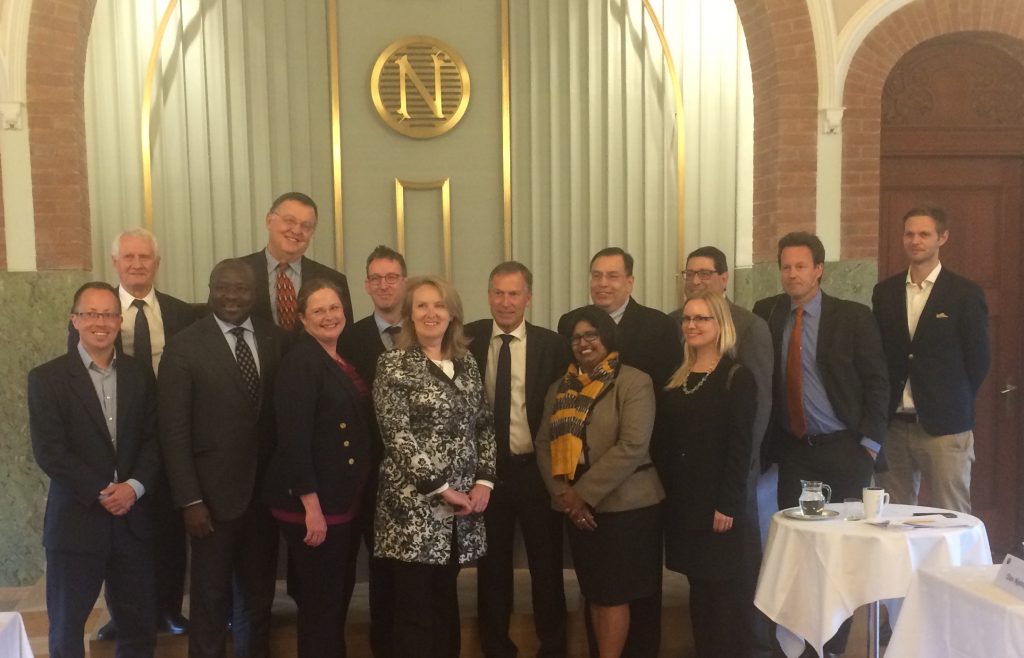
This year, in addition to putting together the program for this September’s Nobel Peace Prize Forum, we have had the opportunity to help facilitate a set of dialogue sessions on the challenge of nuclear security in the 21st Century. On May 31st at the United Nations in New York and June 7 & 8th at the Nobel Institute in Oslo, experts from around the world gathered for two high-level dialogues that responded to the recent Nuclear Security Summits and the current UN negotiations on banning nuclear weapons. Working with the Foreign Policy Association and Norwegian Nobel Institute, and funded by a generous grant from the Carnegie Corporation of New York, these discussions took on the crucially important topic of nuclear security in a time of dramatic political change and instability in the international arena. Participants explored the path forward toward greater security of nuclear materials and next steps on arms control talks, including the current nuclear weapons ban negotiations taking place at the United Nations.
Speakers at the meeting at the United Nations in New York included:
- Senator Richard Lugar (click here for a link to video of his remarks)
- Ambassador Laura Holgate, Harvard’s Belfer Center
- Beatrice Fihn, Executive Director of the International Campaign to Abolish Nuclear Weapons
- David A. Hamburg, President Emeritus of the Carnegie Corporation of New York
- Maleeha Lodhi, Permanent Representative of Pakistan to the United Nations
- Hahn Choong-hee, Deputy Permanent Representative of the Republic of Korea to the United Nations
- Vladimir K. Safronkov, Deputy Permanent Representative of the Russian Federation to the United Nations
- Jan Kickert, Permanent Representative of Austria to the United Nations (click here for a link to video of his remarks)
- Christopher A. Ford, Special Assistant to the President, Senior Director for Weapons of Mass Destruction and Counterproliferation on the National Security Council
- Toby Dalton, Co-Director of the Carnegie Endowment’s Nuclear Policy Program
- Kier Lieber, Georgetown University
- Daryl Press, Dartmouth College
- Mark S. Bell, University of Minnesota
Speakers at the Nobel Institute in Oslo included:
- Olav Njølstad, Director of the Norwegian Nobel Institute
- Yukiya Amano, International Atomic Energy Agency, Director General
- Erlan Idrissov, Former Minister of Foreign Affairs of Kazakhstan
- Lassina Zerbo, Executive Secretary, Preparatory Commission of Comprehensive Test Ban Treaty
- Chris Hobbs, Associate Professor of War Studies at King’s College London
- Kenneth N. Luongo, President and founder of the Partnership for Global Security
- Jacek Kugler, Professor, Claremont Graduate College
- Laura Holgate, Fellow at the Harvard Belfer Center, Former US Ambassador to IAEA
- Tariq Rauf, former Coordinator, Multilateral Approaches to the Nuclear Fuel Cycle at the IAEA
- Elena K. Sokova, Deputy Director, James Martin Center for Nonproliferation Studies Middlebury Institute of International Studies at Monterey
- Målfrid Hegghammer, Associate Professor, University of Oslo
- Rajeswari Pillai Rajagopalan, Senior Fellow and Head of the Nuclear and Space Policy Initiative at the Observer Research Foundation (ORF), New Delhi.
- Anatoly Diyakov, Professor of Physics at the Moscow Institute of Physics and Technology and founding Director of the Center for Arms Control Studies
- Nils Bøhmer, Managing director of the Bellona Foundation
The Nobel Peace Prize Research Institute produced two nice synopses of the talks, which can be accessed here.
Given the robust debate and progress made with these two sessions on nuclear security, we will be building on this year’s talks, and picking up on several of the key issues identified at these sessions when we reconvene in New York and Oslo in 2018. Given the need for new perspectives on these global challenges, and in looking toward the development of new leadership in the nuclear field, we will be inviting a set of young practitioners and scholars from government, non-profit, and academic institutions from around the world to pick up the torch of these dialogues.
For the third high-level dialogue, to take place in New York the week of May 27th, 2018, we will explore the dynamics of great power politics and nuclear policy, particularly U.S.-Russia-China relations, in shaping a new regime around nuclear security and disarmament for the 21st Century. This first round of dialogues focused primarily on the implementation and strengthening of the nuclear security regime, in the wake of the Nuclear Security Summits and Pres. Obama’s Prague agenda. These security initiatives are crucial to the ongoing work of minimizing risks of nuclear materials falling into the hands of extremist non-state actors, and safeguarding the whole range of nuclear materials, under both civilian and military control.
But these efforts on many fronts, whether it is in relation to the militaries’ nuclear stockpiles, the Comprehensive Test Ban Treaty (CTBT), or the Iran or North Korea nuclear programs, all hinge on greater cooperation between the great powers. The high-level dialogues in Oslo in June 2018 will examine the Humanitarian Pledge and efforts toward disarmament. We will report out the cumulative results of these dialogues with a panel discussion at the 30th Annual Nobel Peace Prize Forum, to be held in Minneapolis on September 21-22, 2018.
The work of peacemaking and regime-building takes place slowly, day by day, mostly under the radar, and beyond the noise of the daily news and headlines. It is in this difficult, painstaking work, however, that our greatest hopes lie, and we will continue to engage in this work in the months and years to come.
